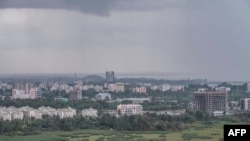The government said Wednesday it had imposed curfews in six major cities hit by the unrest in the northern region, including the capital Bahir Dar and the holy city of Lalibela, a UNESCO World Heritage site.
The State of Emergency General Directorate announced the move after declaring that the armed forces had "freed" the cities from local fighters it described as bandits.
"Today it's extremely quiet in the city, no-one is moving," said one Bahir Dar resident who gave his name only as Tesfahun.
"ENDF (Ethiopian National Defence Force) is here roaming the city... there are door-to-door checks by the soldiers searching for possible suspects," he told AFP, adding that no gunfire had been heard.
Residents of Lalibela and the region's second biggest city Gondar gave similar accounts to AFP, saying the militiamen, known as Fano, had retreated.
Under the curfews which are due to run until Aug. 23, the movement of all vehicles, except emergency and security vehicles, is forbidden after 7:00 pm and public meetings or rallies have been banned.
Flights to the region were resuming on Thursday after Ethiopian Airlines announced it was ending a brief suspension of operations to Bahir Dar and Gondar.
There has been no official casualty toll from the unrest, but hospital doctors in two of the affected cities told AFP on Wednesday that scores of civilians had been killed or injured.
Tesfahun said funerals had been held in Bahir Dar churches on Wednesday evening for civilians killed in the crossfire.
Access to Amhara is restricted for journalists and it is not possible to independently verify the situation on the ground.
Prime Minister Abiy Ahmed's government last week declared a six-month state of emergency in Amhara after the fighting erupted, just nine months after the end of a devastating two-year war in the neighbouring Tigray region.
Although the Amhara militias fought alongside federal troops in the Tigray conflict, tensions surfaced earlier this year after the government announced it was dismantling regional forces across Ethiopia.
The move triggered protests by Amhara nationalists who said it would weaken their region's defences.
A mosaic of more than 80 ethno-linguistic communities, Ethiopia has long struggled to manage the diversity within its borders.










Forum